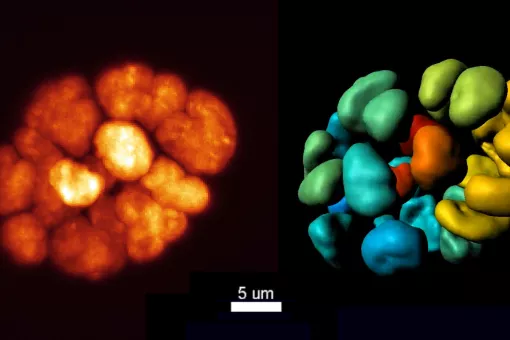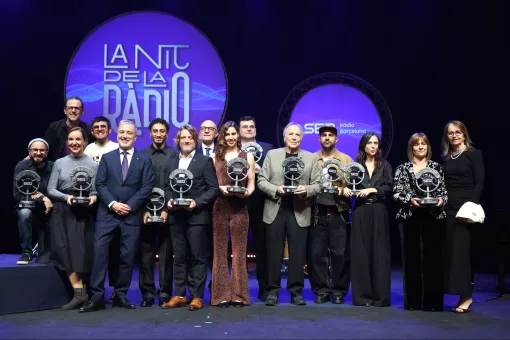Images
The second video, "Magical Choreography" (02:52), is devoted to Xavier Salvatella, ICREA researcher and holder of an ERC grant, awarded in 2015.
This biophysicist studies protein folding using the Androgen receptor as a model—a receptor linked to Kennedy disease —a rare neurodegenerative condition —and also to prostate cancer.
His research could lead to new drug treatments for both conditions. "Doing what we do is an honour but also a responsibility," says the scientist.
Xavier Salvatella (Barcelona, 1972), a biophysicist at the Institute for Research in Biomedicine (IRB Barcelona), is the focus of "Magical Choreography"* (02.52), the second video of the Meet Our Scientists. This series was launched in January on IRB Barcelona’s YouTube channel, with the aim to promote its scientists, attract talent, and disseminate biomedicine. Called "Light and credibility" (2.56), the first video, devoted to ICREA researcher Roger Gomis, addressed metastasis, challenges, and Playmobil.
Xavier Salvatella holds a PhD in Chemistry from the University of Barcelona. He did his postdoctoral training in Cambridge, and in 2008 he set up the Molecular Biophysics lab at IRB Barcelona, where he joined the faculty through an ICREA contract. In recognition of the excellence and innovative nature of his research, in 2015 he received competitive funding from the European Research Council (ERC), through a 2 million euro-grant for a 5-year project.
His lab is focused on understanding how signals are transmitted inside proteins, a key question in biology that could transform drug discovery. “This is what we refer to as concerted conformational motions; they can be equated with the choreography of dancers—understood as atoms—, in which if the first one raises an arm, the last one in the chain will also do the same,” explains Salvatella.
Disclosure of these “internal highways” through which information is transmitted could transform the field of drug discovery, as it would imply the identification of many other valid sites in proteins towards which to direct drugs. The researchers perform these studies on a proteins of biomedical relevance, namely the Androgen receptor, as it is, on the one hand, associated with a rare neurodegenerative condition which has no treatment, Kennedy disease, and, on the other hand, also with advanced stages of prostate cancer. The research done by Salvatella’s team may pave the way to new drug treatments for both conditions.
"Doing research is an honour but also a responsibility. Society expects much of us and with the techniques and knowledge that we have we should attempt to find solutions to help patients," explains Salvatella in the video.
Over three minutes, the IRB Barcelona researcher briefly describes his science and explains what motivates him and the contributions that his work can make to society. Furthermore, through a personal belonging, he reveals a more personal side of his character.
The videos seek to show the insight, passion, character and talent of the scientists that work at the centre. They also provide a new tool through which to make people aware of the biomedical research lines and expertise of the 23 laboratories and 6 scientific platforms that currently make up the centre—information that could serve to attract new talent.
A new video will be available on YouTube and via the IRB Barcelona’s website every month.
*Original version in English, subtitles in English, Spanish and Catalan. To switch subtitles on, press CC and in Settings, choose between Catalan, Spanish and English.
Rare Diseases at the IRB Barcelona
Scientific literature documents between 6,000 and 7,000 rare diseases— conditions defined by the European Union as those that affect only 5 in 10,000 people or fewer. In Europe alone, between 27 and 36 million people have some form of rare disease. Because these diseases are complex, many have no treatment, thus leaving those who suffer from them, and their families and carers a heavy burden. In Spain, about 3 million people are affected by rare diseases, of which 400,000 are in Catalonia.
Innovative and cutting-edge basic research offers enormous potential to take the knowledge gained in cell and molecular biology laboratories and use it to design therapies for rare diseases. In this regard, IRB Barcelona is currently conducting about 20 studies in rare diseases, among them Lafora disease, Kennedy syndrome, diverse type of rare cancers, Friedreich Ataxia, Cystinuria, mithocondrial diseases, Charcot Marie Tooth disease, Ataxia-telangiectasia and Seckel syndrome.
About IRB Barcelona
The Institute for Research in Biomedicine (IRB Barcelona) pursues a society free of disease. To this end, it conducts multidisciplinary research of excellence to cure cancer and other diseases linked to ageing. It establishes technology transfer agreements with the pharmaceutical industry and major hospitals to bring research results closer to society, and organises a range of science outreach activities to engage the public in an open dialogue. IRB Barcelona is an international centre that hosts 400 researchers and more than 30 nationalities. Recognised as a Severo Ochoa Centre of Excellence since 2011, IRB Barcelona is a CERCA centre and member of the Barcelona Institute of Science and Technology (BIST).







